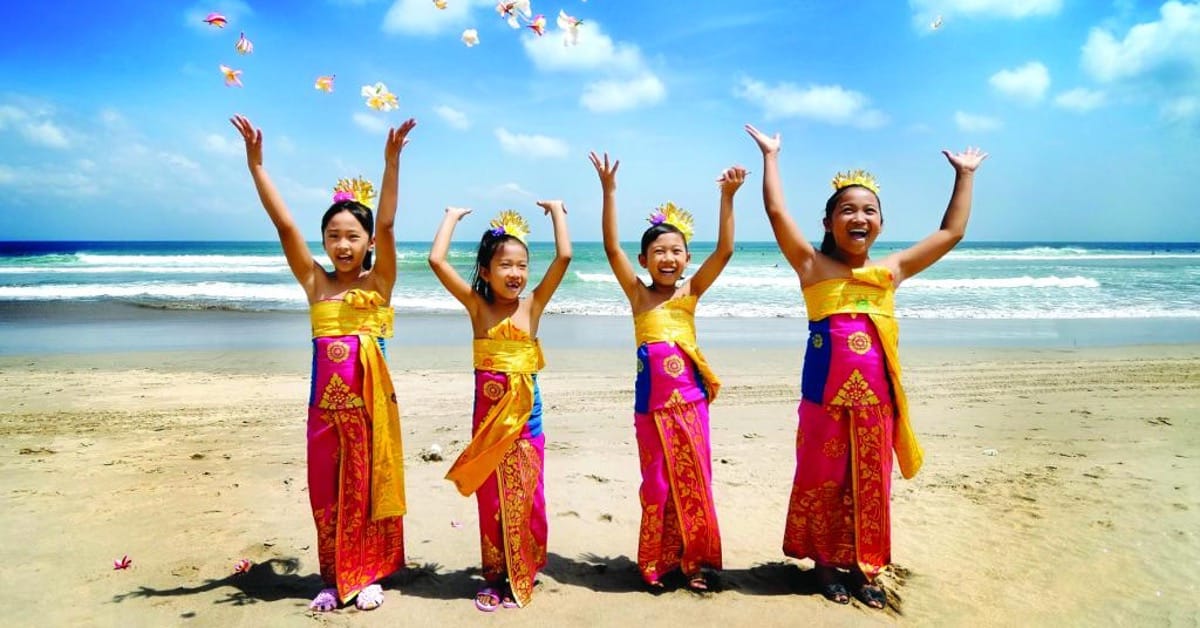Bali is an island renowned for its stunning beaches, lush jungles, and vibrant culture. From traditional dances and ceremonies to ancient temples and unique customs, Bali offers a truly authentic experience that is unlike anything else in the world.
Whether you’re a first-time visitor or a seasoned traveller, here’s a guide to the rich culture of Bali.
Discover Bali Culture
Balinese Dance
Balinese dance is an integral part of the island’s culture and is performed at various ceremonies and festivals.
The dances are known for their intricate movements and brightly colored costumes, and tell stories from Hindu mythology.
Visitors can watch a traditional dance performance at a number of venues across the island, including the Ubud Palace.
Temples and Ceremonies
Bali is home to countless temples and shrines, each with its own unique history and significance. Many of these temples are still used for ceremonies and rituals, and visitors can observe these rituals during their visit.
The island is also home to the famous Pura Besakih temple, the largest and most important temple on the island.
Custom and Traditions
Balinese customs and traditions are a fascinating part of the island’s culture. From the intricate offerings and prayers made at temples to the unique way in which Balinese families celebrate life’s milestones, visitors can experience the customs and traditions of Bali by simply observing daily life on the island.
Handicrafts and Art
Bali is also known for its rich artistic heritage, and visitors can find an array of traditional handicrafts and artworks on the island.
From wood carvings and woven textiles to intricate jewelry and paintings, Bali is a veritable treasure trove of cultural creativity. Visitors can find traditional handicrafts at local markets and art shops across the island.
Cuisine
Balinese cuisine is a fusion of traditional Indonesian flavors and influences from other cultures, including Chinese and Indian.
Visitors can sample a range of delicious dishes, from spicy sate and traditional rice dishes to sweet treats like sticky rice pudding.
Visitors can also participate in cooking classes to learn how to make traditional Balinese dishes.
These are just a few of the many cultural experiences that await visitors to Bali. Whether you’re interested in traditional dances, ancient temples, or the customs and traditions of the island, Bali has something to offer everyone.
FAQ
Bali’s culture stands out for its distinctive, relaxed, and spiritual atmosphere, setting it apart from the rest of Indonesia. Unlike the predominantly Muslim regions of Indonesia, Bali is primarily Hindu, fostering a more spiritual approach to religion. This unique blend of spirituality is less dogmatic, promoting a peaceful coexistence and a laid-back lifestyle that deeply influences the island’s daily life and interactions.
Respecting Bali’s culture involves understanding and adhering to several important practices:
Avoid aggressive or disrespectful body language: Crossing arms, placing hands on hips, or showing soles are considered provocative.
Respect personal space and sacred beliefs: Do not touch heads or point at people, as the head is deemed the soul’s core.
Observe local customs in homes and sacred places: Removing shoes before entering, wearing appropriate attire like a sarong and sash in temples, and avoiding entry during menstruation are key.
Maintain harmony: Keep emotions subdued, avoid public displays of anger, and move around offerings carefully.
Engage respectfully: Learn basic Indonesian phrases, refrain from discussing politics, use both hands for giving, and respect dining etiquette. These guidelines help maintain the island’s harmonious and respectful atmosphere.
Balinese Hinduism is the cornerstone of Bali’s cultural identity, practised by over 80% of its population. Despite the challenges of globalisation and tourism, the Balinese have preserved their rituals and customs, ensuring the continuity of their religious practices and cultural heritage.
Bali’s uniqueness lies in its predominantly Hindu faith, distinct from the Muslim majority of Indonesia. Balinese Hinduism has unique characteristics, visible in the island’s temple architecture and religious practices, reflecting a blend of local beliefs and Hindu traditions.
Public displays of affection, particularly kissing, are generally not accepted in Bali. While holding hands is common, the Balinese culture values modesty and discretion in expressions of romance. Visitors are encouraged to respect these local norms to avoid discomfort or offence.
Tipping is not a customary practice in Bali or Southeast Asia. While not expected, tips are appreciated as gestures of gratitude for good service. This approach to tipping reflects the region’s broader cultural attitudes towards hospitality and service.
Bali’s culinary scene is a vibrant tapestry of flavours, heavily influenced by the liberal use of spices such as turmeric, cumin, and cloves. The belief in turmeric’s health benefits is widespread, and sambal, a crucial condiment, accompanies nearly every meal. This rich food culture reflects the island’s diverse and spice-forward culinary traditions, offering a unique taste experience to locals and visitors alike.
A seasoned traveller and Bali enthusiast with a wealth of experience and knowledge about the island. With a passion for exploring and discovering Bali’s hidden gems, Ben has a keen eye for details and a deep understanding of Bali’s culture, history, and unique features. With years of travel experience under his belt, he has explored almost every corner of the island and can provide invaluable insights and recommendations to make your trip unforgettable. From the best beaches to the tastiest local cuisine,he’s has got you covered.

